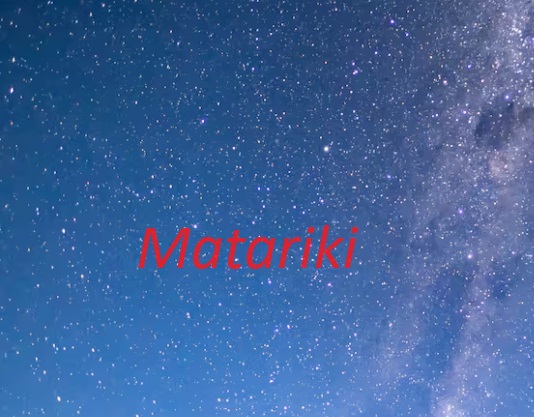On a clear winter night in Aotearoa, young Hemi sat by the fire, his eyes wide with anticipation. The warmth of the flames flickered across his face as he looked up at his grandmother, Nanny Hera, who was about to tell a story. Tonight was special; it was the beginning of Matariki, the Māori New Year, a time for remembering the past, celebrating the present, and looking forward to the future.
“Whakarongo mai,” Nanny Hera began, her voice soft but strong. “Listen carefully. Tonight, I will tell you the story of Matariki and the dance of the stars.”
Hemi leaned closer, eager to hear the tale. Nanny Hera continued, her eyes twinkling like the stars above.
“Long ago, the night sky was a canvas of stories. Among them was the story of Matariki, the cluster of stars that appear in the winter sky. These stars are more than just beautiful lights; they are the seven sisters, guiding and protecting our people.”
She pointed to the sky, and Hemi followed her gaze. There, just above the horizon, the Matariki cluster shimmered.
“Each star has a name and a role,” Nanny Hera said. “Matariki, the mother, watches over her daughters: Tupu-ā-nuku, Tupu-ā-rangi, Waipunarangi, Waitī, Waitā, and Ururangi. They help us remember the importance of family, the bounty of the earth, and the beauty of the heavens.”
Hemi’s eyes sparkled with curiosity. “What do they do, Nanny?”
“Ah, each has her own special task,” Nanny Hera explained. “Tupu-ā-nuku encourages us to respect the land and its fruits. Tupu-ā-rangi reminds us of the treasures from the sky, like the birds and the rain. Waipunarangi tells us of the water’s journey, and how it nourishes the earth. Waitī and Waitā are the guardians of fresh and saltwater, respectively, while Ururangi dances with the winds, showing us the importance of the air we breathe.”
As Nanny Hera spoke, Hemi imagined the stars coming to life, each sister performing her dance in the night sky. The wind whispered through the trees, as if echoing the ancient tales.
“During Matariki,” Nanny Hera continued, “we gather to remember our ancestors, celebrate the present, and look forward to the future. We share food, stories, and songs. It’s a time to be with family and to be grateful for what we have.”
Hemi felt a deep sense of connection to the stars and his ancestors. “Nanny, can we sing a song for Matariki?”
Nanny Hera smiled and began to hum a soft tune. Hemi joined in, their voices blending with the night. The stars seemed to twinkle brighter, as if joining in their celebration.
As the song ended, Nanny Hera hugged Hemi close. “Remember, my moko, Matariki is a time of new beginnings. It’s a reminder that, like the stars, we are all connected, and our stories are part of something much bigger.”
Hemi nodded, feeling a warmth that came not just from the fire, but from the stories and the stars. He knew that this Matariki would be one he would always remember, a night when he felt the embrace of his ancestors and the promise of the future shining down from the sky.
And so, under the dance of the Matariki stars, Hemi and his family celebrated, weaving their own stories into the timeless tapestry of the night.





